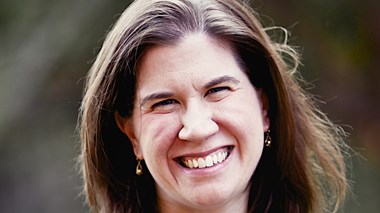
My daughter Eden is slow. I know that sounds negative. It feels almost like a betrayal to write it. Our world rarely welcomes slowness. But Eden, who is nine years old and has Down syndrome, remains unaware of the need to rush. Ever.
This morning she walked out of the house with mismatched mittens, me pushing her from behind and her dad ushering her forward, one bus driver and forty kids waiting for her to cross the street. With hat askew and her backpack slipping off her shoulder, she stopped in the driveway, took a deep breath, and said, "Isn't it beautiful out today? It's really not too bad!"
Charming now. Infuriating then.
I do love the idea of slow food, slow reading, slow and thoughtful living. But not on a Monday morning. Because on Monday, or any school day, I don't want my children to live slowly. I want them to get up, get dressed, and catch the bus so I don't need to wait in the jumble of cars outside their school and then stand in the Parent Line of Shame to receive tardy slips.
One morning a few weeks ago we were close to being on time for the bus without even having to wave for the driver to wait. Then Eden noticed a piece of paper on the ground and decided she should throw it away. Just seconds from stepping out the door, she turned toward the wastebasket while talking to the piece of trash in her hand.
"We'll just go over here, okay? I'm going to put you in here before I go to school."
Then she showed her imaginary friends how to throw something away. In great detail. I felt my body tense as I waited to see her hand let go of that paper. I called to her, but her imaginary friends spoke more loudly. And I was torn, as always, between wanting to cherish who Eden is and wanting to help her work within daily realities.
Eden's exquisite slowness flows beyond getting places on time. Her classmates wait for her to join them in line as she puts on her coat. We often say, "Let Eden finish what she's saying," to her talkative younger sister who wants to interrupt. Even pain takes a few extra seconds to register in Eden's brain.
Progress, too, takes a different shape in Eden's life. It took her four years to learn the names of coins. Then one summer the knowledge slipped away, a wisp of facts floating from her mind. We started again. Slowly.
Sometimes I wonder how our expectations for Eden would change if our culture's mindset were different. What if saying someone was "slow" were the greatest compliment? And the opposite were considered a weakness ("He's still learning. Right now he's very fast")? Maybe kids like Eden, the slow ones, contribute to a quiet revolution against our busyness. Maybe they are on a secret mission to reverse our priorities.
After all, if you only know that Eden is "slow," you might not realize how smart she is. You might not guess that she is often the first one in the room to understand a joke—or to make one. You might not appreciate that she can remember events that happened three years ago, and what she was wearing, and how she felt at the time.
Slowness is not something Eden will ever grow out of. Monday mornings aside, I'm not sure I want her to. Because even as I try to prepare her for life in a high-speed world, I want to be aware of how I can leave behind my own need to hurry. How I can grow up to be more like my daughter.
Often, after the rest of us are done with dinner, Eden sits alone at the kitchen table finishing her meal. One bite of yogurt. A pause to rest. Another bite. Long periods of sitting, thinking.
I fuss with the dishes to keep her company. She tells me, "Mommy, come be with me." I know what she means, but I want to get the dishwasher loaded.
"I'm right here, sweetie."
Eden, exasperated, points to the stool next to her. "No, Mommy, come be with me here. Don't do anything."
So I sit. I look at her gentle hands, her perfect eyebrows. We smile at each other. We talk about yogurt. We are slow together.
When dinner is finally done for another night—or when we're finally in the car or at the appointment—I pause and wonder how I can live out my daughter's kind of slowness. Not to be late or lazy or unkind, but to notice. To be really, really interested in the chalky scrub of moon still in the sky this afternoon. To be aware that fresh snow on our trees is as beautiful in April as it is in October. To see her.
Instead, I start the car rolling down the driveway while still putting on my seatbelt in the hope that I'll get to the corner light before it turns red. I feel victorious if writing an article or cleaning the kitchen takes less time than I had expected; I feel like a failure if it doesn't. When a friend texts that she's running five minutes late, I think of six things I can do while I wait for her. Unlike my contentedly time-free daughter, I am conscious of each hour—what I can fit into it and what that means for what I will do next.
And even though I want Eden to get in the car on time, to remember what day it is, to be academically ambitious, I hate to see that part of myself in her when it appears. When her eyes widen with anxiety as the bell rings and she is not yet in the school doors, I want to swoop her up and take her home to read for the rest of the day. When she asks, "Are we late again?" on the way to the doctor, I want to tell her that whatever time we get there will be the right time. Speed and drivenness are so far from who she is that when she tries them on they fit awkwardly.
I begin to realize they fit awkwardly on me, too. Perhaps on each of us.
So I try to receive slow times during the day. The extra minute snuggling my kindergartener when she is warm and soft from bed in the morning. The opportunity to smile at the woman in the checkout line even though she can't find her coupons and the line next to me would have been faster. The quiet walk with other church members up the aisle for the Eucharist, the pause of eye contact with the chalice bearer before sipping. Slow on slow.
When I tell Eden "We need to go!" and she nods and does a few more dance moves around the living room, she is telling me again that she disagrees with me on what is most important in that moment. Sometimes, I realize, she is right. She is aware of time. Just not aware of my kind of time.
Perhaps Eden has simply never lost the slowness of heaven. A heaven that brought the Messiah a few hundred years late, slow to answer Israel's longing. A heaven that allowed Jesus to linger, slow to visit the dying Lazarus. A heaven that is home to a mysterious God, slow to give the answers I want for my little girl with the extra chromosome.
Tonight before bed, I tell Eden what a joy she is to us. She reaches up to play with my hair and says, "Oh, Mommy, you just make my heart more prettier."
I look in her eyes and wonder. Can I love slowness when it is something I must do, not something I choose to do? Can I welcome the in-between times—and dance through them? On the days of only questions, can Eden's poetry of slowness seep into my waiting?
I kiss her head, adjust her oxygen cannula, and pull her bedspread up under her chin. She sighs. "Don't you just love this world, Mommy?"
This is a common declaration from her recently. I always say, "It is a good world, isn't it, sweetie?" but I stumble on the words. Because sometimes the hardness of this good world leaves little room to notice anything else. But Eden is so certain of joy, so immersed in the goodness, that I agree with her. Every time.
"Sweet dreams," we tell each other. She grins. I slip out the door.
My daughter Eden is slow. And every day she makes our hearts more prettier.

Elisa Fryling Stanford is a writer and editor living in Colorado. She is the author of Ordinary Losses: Naming the Graces That Shape Us and blogs occasionally at www.arthouseamerica.com. Elisa and her husband, Eric, have two daughters.
This post is one in a series of "Perfectly Human" guest posts focused on disability and common humanity.
Support our work. Subscribe to CT and get one year free.
Recent Posts

What Slowing Down Teaches You That Rushing Never Will
What Slowing Down Teaches You That Rushing Never Will
What Slowing Down Teaches You That Rushing Never Will
What Slowing Down Teaches You That Rushing Never Will














